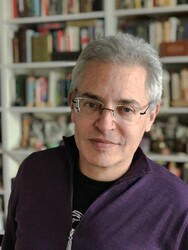John Oakes: The Fast: The History, Science, Philosophy, and Promise of Doing Without
March 2, 2024 by David
Filed under Non-Fiction, WritersCast
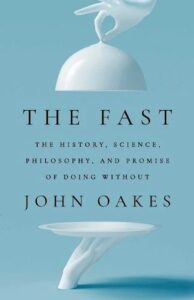 The Fast: The History, Science, Philosophy, and Promise of Doing Without—John Oakes—Avid Reader Press / Simon & Schuster—Hardcover —9781668017418—320 pages—$30—February 13, 2024—ebook versions available at lower prices
The Fast: The History, Science, Philosophy, and Promise of Doing Without—John Oakes—Avid Reader Press / Simon & Schuster—Hardcover —9781668017418—320 pages—$30—February 13, 2024—ebook versions available at lower prices
If you’re expecting to find a “how to guide to fasting” you will have to look elsewhere. John Oakes is far too good a writer and thinker to spend his time writing something simple like a guide book or even a “rah rah” tome aimed at encouraging you to take up the idea of “intermittent fasting” for yourselves. You might decide to try it out after reading The Fast, but that’s not his purpose and not why you should want to read this book. If you are already engaged in fasting, you should read this book. Perhaps it will be most especially useful during the meditative moments while you are in the midst of your own fast.
Oakes is more interested in a deeper approach to this practice, giving it historicity and enabling us to explore for ourselves how denial of a core bodily function can alter consciousness and help us better understand ourselves. This kind of antidote to the habits of modern life does have an appeal to many of us, but even if you are not going to be a practitioner, you will find yourself captivated, as he is, by the science, history, philosophy and spiritual background of fasting and the denial of physical needs. For Oakes, the ideas and the connection to human spirituality are as important as the specific practices themselves. I’m glad of that, as it makes reading this book that much more rewarding to engage with.
I will also note that Oakes, who has been an editor and publisher for many years, is a really terrific writer and therefore you can read this book for the pleasure good writing affords. As I am sure many of you who listen to this podcast have noticed, there are a lot of badly written books out there and no one wants to spend their limited time reading them. Given the vast number of choices of what to read, it is a particular joy to discover a really good writer. Bravo Oakes for spending a lifetime learning how to write, and bravo Avid Reader Press for publishing this book. I hope you will consider reading it yourself after you listen to our conversation here. Whether you decide to fast or not. For myself, much as I like this book, I am happier eating than not, even if it is an indication of my generally shallow approach to spirituality.
I’ve known John Oakes for a number of years through our mutual involvement in independent publishing. He is currently the publisher of The Evergreen Review. He is also editor-at-large for OR Books, which he cofounded in 2009. OR has been a singularly contrarian publisher for many years, built to demonstrate an alternative approach to traditional reliance on a certain popular online bookseller. Oakes has written for a variety of publications and The Fast is his first book.
We had alot of fun talking together about John’s book. Enjoy…
Podcast: Play in new window | Download
Susanne Paola Antonetta: The Terrible Unlikelihood of Our Being Here
August 11, 2021 by David
Filed under Non-Fiction, WritersCast
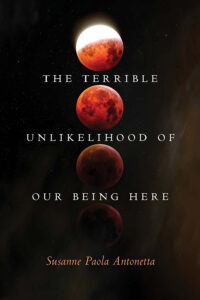 The Terrible Unlikelihood of Our Being Here – Susanne Paola Antonetta – 978-0-8142-5780-7 – 248 pages – paperback – February, 2021 – Mad Creek Books – $22.95 – ebook editions available at lower prices
The Terrible Unlikelihood of Our Being Here – Susanne Paola Antonetta – 978-0-8142-5780-7 – 248 pages – paperback – February, 2021 – Mad Creek Books – $22.95 – ebook editions available at lower prices
Sometimes one literally chances across a terrific book; it appears unbidden and takes over one’s complete attention. A surprise appearance in the daily maelstrom of life. This remarkable memoir by Susanne Paola Antonetta did just that for me, striking me like a lightning bolt out of the blue, and completely altering the trajectory of my thinking.
I’ve read alot of books and loved many of them. This book stopped me in my tracks. Reading it over the course of a few evenings, this author made me think and feel and understand another person’s experience, her deeply felt and beautifully described mind and being. That is quite an accomplishment and makes this a very special book indeed.
Antonetta brings us into her youth, the place of “Summerland” and her family’s life on the marshy border of the ocean in southern New Jersey. Like the descriptions of physics and astrophysics she intersperses between her memory pieces, her description of this place, the people in her family, and her own life are simultaneously dreamlike and definitive.
Her grandmother and mother are key figures throughout. And then she introduces her own experiences with bipolar disorder, drugs, and the trauma of electroshock treatment woven together with those brilliantly written descriptions of ideas in neuroscience and physics, and then there are her conversations with psychics and meditations on understanding their messages from inter-dimensional spaces. What a journey!
This is a memoir with great power and beauty, taking us into the past, the present and realms beyond, where ideas and perhaps the ground of being may or may not be found.
I won’t tell you much more about the book. I think you need to discover it for yourself. I loved it, and I really enjoyed speaking to Susanne as well. we had a terrific talk about this book and her writing.
This is a book I intend to re-read and work to understand more fully. Once is not enough.
“Antonetta tackles nothing less than consciousness and existence, employing an amalgam of science writing and mysticism. It’s hard to imagine another writer who could not only make such a project work but also make it seem natural and necessary.” —Robin Hemley, author of Borderline Citizen: Dispatches from the Outskirts of Nationhood.
Susanne Paola Antonetta is has written a number of books, including Make Me a Mother, Curious Atoms: A History with Physics, Body Toxic: An Environmental Memoir, A Mind Apart: Travels in a Neurodiverse World, a novella, and four books of poetry. Her work has been published in a variety of newspapers and magazines, including the New York Times, the Washington Post, Orion (one of my favorite magazines), the New Republic, and others. She lives in Bellingham, Washington.
Visit Susanne’s website for more information about her and her work.
You can buy the book from Bookshop.org.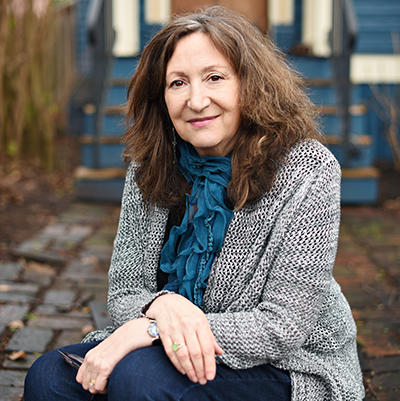
Podcast: Play in new window | Download
Anders Dunker: Rediscovering Earth
May 18, 2021 by David
Filed under Non-Fiction, WritersCast
 Rediscovering Earth: Ten Dialogues on the Future of Nature – conversations with Anders Dunker – OR Books – 9781682195086 – Paperback – 240 pages – $23 – ebook versions available at lower prices
Rediscovering Earth: Ten Dialogues on the Future of Nature – conversations with Anders Dunker – OR Books – 9781682195086 – Paperback – 240 pages – $23 – ebook versions available at lower prices
Thinking about how to think about climate, earth, humans on it, and the future, are major challenges for all of us who care about the future of our planet. It may be that most of us alternate between despair and rage, and even with an optimist’s outlook, we have trouble dealing with the sheer scope of what is happening to our surroundings (I think using the words “environment” and “earth” and “planet” has now become counterproductive).
I am constantly searching for writing, whether it is in books, online or in magazines, that will offer me constructive perspectives, different and hopefully better conceptual frameworks than those we have developed, toward making it possible to be both continually engaged and continually energized. I don’t usually feel I can do that on my own.
Anders Dunker’s collection of conversations with some of the deeper thinkers about the future and us in it, turns out to be very useful. The diverse viewpoints, the language of thoughtfulness and care, the commitment to inquiry, are all inspiring elements of this short book. And with such a diverse set of outlooks, it is possible to not lose sight of the core reason for this book to exist – to inspire hope.
Dunkers poses this question: “if we know that we are destroying the planet, our habitat, why do we continue to do it?” His dialogues attempt to investigate this question, and thereby come to some sense of how we might go forward, not ourselves alone, but the nature that we rely on, together.
This is the challenge we face right now. The challenge will be different in a few years, the unfolding story will force a reckoning. For now, those who read the stories in Rediscovering Earth will be able to come to a better sense of what we can and must do together in this moment.
Dunkers proposes that our future, nature itself, will be based on how we navigate the realm of culture, including philosophy, art and literature, the groundwork of our being, as much as or more than in scientific and technological matters. In order to act, we must redefine ourselves, become truly planetary citizens, and recognize how we are all connected, and then act upon, from that, understanding.
We had a terrific conversation, not only about the book and the contributors to it, but about how we will uncover the future and live in it together. A very hopeful experience. I came away from our talk fully energized, and feeling stronger.
Anders Dunker bio (from his website): Born in Norway, raised in the countryside in a family much dedicated to wildlife and nature. Educated in humanistic subjects and Cultural History at the University of Oslo, with Philosophy, Comparative Religion and Comparative Literature as main subjects. Teacher of Aesthetics and other subjects at the University of Oslo, Philosophy and Cultural History in Rome and Barcelona.
Senior lecturer at Kulturakademiet (Norwegian private college) for 10 years, now writer for acclaimed Norwegian & international newspapers and magazines (Le Monde diplomatique, LA Review of Books, NyTid, Vagant, Samtiden, Modern Times Review, Agora). Board member of the Norwegian Writers’ Climate Campaign,
Series Editor of Futurum Collection at Existenz Publisher (Norway) and Editorial Board Member at Technophany, a journal for Philosophy and Technology.
His current book projects include an essay on the future as seen from California and a volume on Peter Sloterdijk’s philosophy. Anders currently lives with his wife, an environmentalist and animalist singer, in Los Angeles, California. He is also a plein air painter.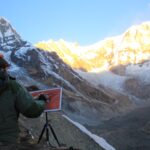

From Dialogue One: “The Rediscovery of the Earth—with Bruno Latour”
Anders Dunker (AD): Historically, the age of discovery is over. Are we none the less in a new age—an age of rediscovery—that can lift our spirits and propel us past the nagging feelings of tragedy?
Bruno Latour (BL): Well, it is my way of being optimistic. It is my way of not taking part in the sense of doom. Scientifically and technically, it is perfectly rational to be a pessimist, but I don’t think it makes much sense politically. Optimism has nothing to do with technoscience—DNA plus cognitive science plus robots plus outer space. Instead it is connected with exploring the world we thought we knew. I will borrow the term from you and call our time period an age of rediscovery, even if it is grandiose. What we call local has quite a different meaning in relation to Gaia than it previously had. It now has many different dimensions. The rediscovery of a place is in some ways a cliché—since ecologists have been talking about the same thing for years—but this concept also leads to a different way of framing the world, it leads to another geometry, so to speak. Water gets another meaning. Ice gets another meaning. Industry is considered in relation to the amount of CO₂ in the atmosphere. We see things in new ways. Antibiotics have a different kind of globalization than weeds, for example.
AD: Traditionally, the concept of the local has had a flavor of subjectivity—existence circumscribed by the immediate horizon—in contrast to the scientific gaze, which purports to see everything as if from outer space?
BL: And here lies the error. The local is objective. The gaze from inside the critical zone is completely objective, it is just objective in a different way. What we see is real, but this reality only becomes visible if we learn what different parties are up to, what they need, what they want, what they can accomplish.
Buy the book directly from the publisher, OR Books.
Podcast: Play in new window | Download
Karl Marlantes: What It Is Like to Go to War
October 2, 2011 by David
Filed under Non-Fiction, WritersCast
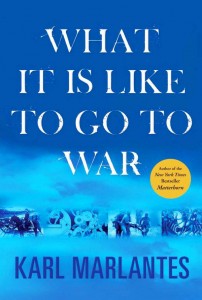 978-0802119926 – Atlantic Monthly Press – Hardcover – $25.00 (e-book and audiobook editions available)
978-0802119926 – Atlantic Monthly Press – Hardcover – $25.00 (e-book and audiobook editions available)
I read Karl Marlantes’ novel, the extraordinary Matterhorn last year (and interviewed him about it for Writerscast – you can listen to that interview here). I don’t think I am alone in believing that Matterhorn is perhaps the finest and most important war novel of the Vietnam generation; for me at least, it belongs in the pantheon of great American war novels (going back to WWI, Thomas Boyd’s Through the Wheat is another great novel written by an former Marine).
It took Karl Marlantes more than 30 years to write and publish the novel we read as Matterhorn its final form. His new book, What It Is like to Go to War, now follows as a deeply thoughtful and moving work of nonfiction about the nature and meaning of war, and what it means to the individual warriors who participate who fight, as well as to the society that gives them that responsibility.
There are many parallels between the two books. I’d recommend you take on the novel first, spend some time thinking about its story and characters, and then move on to this new work of nonfiction, which is a combination of personal memoir, meditation and social, political and cultural analysis and polemic.
Insofar as fiction gives us our deepest emotional and spiritual truths, Matterhorn cannot fail to move you and allow you to feel the reality of what it is like when our best and brightest go to war. Then What It Is Like to Go to War gives us another carefully wrought perspective, what Marlantes has learned from his own experiences and from many years of studying and thinking about war and society.
And we should all be paying attention to what he says here. America has had more people fighting wars for a longer period of time than at any other time in our history. Indeed what does this say about contemporary American society?
In 1969, when he was just 23, Karl Marlantes was an inexperienced lieutenant in charge of a platoon of Marines whose lives were in his hands. His experiences in the jungles of Vietnam , molded and shaped him throughout his life. He has thought deeply about his wartime experiences, how they affected him and his comrades, as well as how other soldiers before and since have gone through similar experiences. In What It Is Like to Go to War, Marlantes weaves accounts of his own combat experiences with analysis, self-examination, and powerful ideas drawn from his wide reading from Homer to the Mahabharata to Jung.
Unlike many of us who feel that war must be ended in modern society, Marlantes starts from the belief that war is an inevitable component of societal and political being. What he is after is to make us think about preparing warriors not for fighting, which we already do quite well, but for living with the effects on those who go to war that derive from participating in the morally unnatural but societally sanctioned acts of killing other human beings.
Most societies that preceded us have used powerful rituals, myths and ceremonies to integrate acts of war into the fabric of their cultures, and to reintegrate their warriors thoroughly into their societies, while our secular, materialist society really offers no tools or methods to warriors (or for that matter to civilians) to create a holistic “story” of why and how war is meaningful and necessary.
One of the many points he made in this book really struck me is that those who send men and women to war are themselves warriors, that actual soldiers (as opposed to guns and bombs) are their weapons. These individuals must fully comprehend what they do, and must find ways to integrate their own acts of war as much as the soldiers on the battlefield who wield the weapons and who witness so much death and destruction on both sides of battle.
I found that the author’s afterword to the book was very important to my understanding and acceptance of his work:
“We must be honest and open about both sides of war. The more aware we are of war’s costs, not just in death and dollars, but also in shattered minds, souls, and families, the less likely we will be to waste our most precious asset and our best weapon: our young.”
“The substitutes for war…are spirituality, love, art, and creativity, all achievable through individual hard work.”
I can’t recommend this book to readers enough. It’s book that, like the work of my friend, Paul Chappell, (Will War Ever End and The End of War) has the potential to shift our societal dialogue about war and what it can and should mean to a modern society.
There’s a fine review of What It Means to Go to War in the NY Times and a very worthwhile interview with Karl on Livewriters about Matterhorn.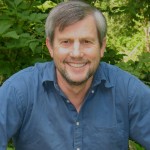
Podcast: Play in new window | Download
Will War Ever End? Capt. Paul K. Chappell
January 31, 2009 by David
Filed under Non-Fiction
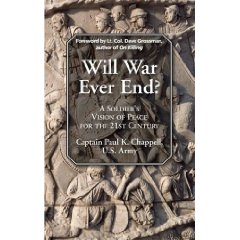
978-1935073-02-4
Ashoka Books, Hardcover $14.95
“There is cause to hope, and believe, that there can be an end to war.”
–Lt. Col. Dave Grossman, U.S. Army (ret.), author of On Killing
Writerscast host David Wilk interviews first time author US Army Captain Paul K. Chappell, whose new book, Will War Ever End? A Soldier’s Vision of Peace for the 21st Century will be published in February, 2009. The author talks about his personal background, why an active duty soldier who has served in Iraq has written a “manifesto for waging peace,” and explores some of the powerful ideas he covers in his new book. In a wide ranging interview Captain Chappell makes clear that achieving peace is not just a cliche, discusses the practical ways we can all work toward an active state of peace on earth, and gives compelling evidence for his reasoning that human beings are not naturally violent. In this interview the author shows why his powerful and original ideas are receiving so much attention among thinkers and activists for peace. The book website is located at www.paulkchappell.com.
Podcast: Play in new window | Download

